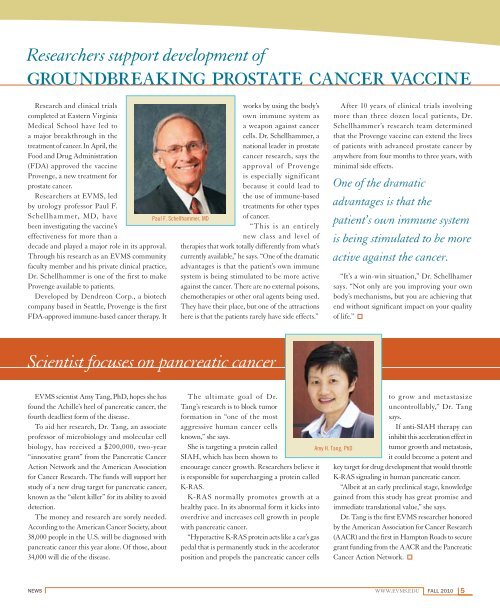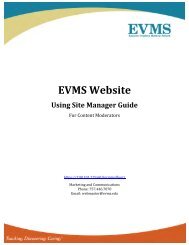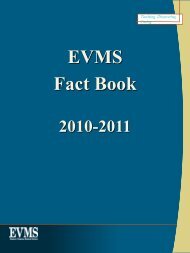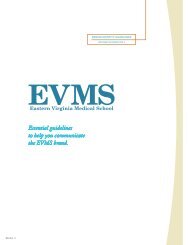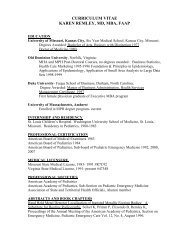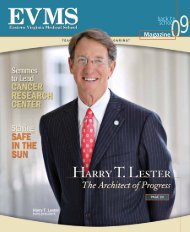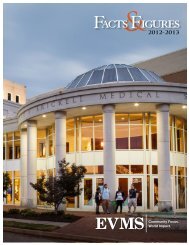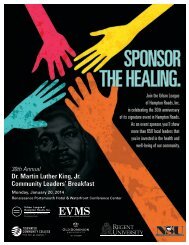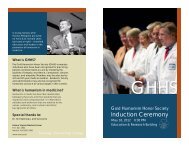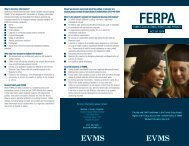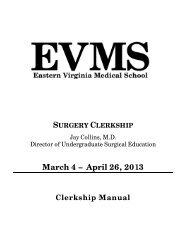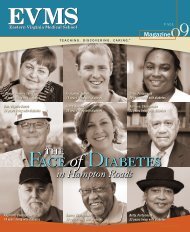Fall 2010 - Eastern Virginia Medical School
Fall 2010 - Eastern Virginia Medical School
Fall 2010 - Eastern Virginia Medical School
You also want an ePaper? Increase the reach of your titles
YUMPU automatically turns print PDFs into web optimized ePapers that Google loves.
Researchers support development ofgroundbreaking prostate cancer vaccineResearch and clinical trialscompleted at <strong>Eastern</strong> <strong>Virginia</strong><strong>Medical</strong> <strong>School</strong> have led toa major breakthrough in thetreatment of cancer. In April, theFood and Drug Administration(FDA) approved the vaccineProvenge, a new treatment forprostate cancer.Researchers at EVMS, ledby urology professor Paul F.Schellhammer, MD, havebeen investigating the vaccine’seffectiveness for more than adecade and played a major role in its approval.Through his research as an EVMS communityfaculty member and his private clinical practice,Dr. Schellhammer is one of the first to makeProvenge available to patients.Developed by Dendreon Corp., a biotechcompany based in Seattle, Provenge is the firstFDA-approved immune-based cancer therapy. Itworks by using the body’sown immune system asa weapon against cancercells. Dr. Schellhammer, anational leader in prostatecancer research, says theapproval of Provengeis especially significantbecause it could lead tothe use of immune-basedtreatments for other typesof cancer.“This is an entirelynew class and level oftherapies that work totally differently from what’scurrently available,” he says. “One of the dramaticadvantages is that the patient’s own immunesystem is being stimulated to be more activeagainst the cancer. There are no external poisons,chemotherapies or other oral agents being used.They have their place, but one of the attractionshere is that the patients rarely have side effects.”Paul F. Schellhammer, MDAfter 10 years of clinical trials involvingmore than three dozen local patients, Dr.Schellhammer’s research team determinedthat the Provenge vaccine can extend the livesof patients with advanced prostate cancer byanywhere from four months to three years, withminimal side effects.One of the dramaticadvantages is that thepatient’s own immune systemis being stimulated to be moreactive against the cancer.“It’s a win-win situation,” Dr. Schellhamersays. “Not only are you improving your ownbody’s mechanisms, but you are achieving thatend without significant impact on your qualityof life.”Scientist focuses on pancreatic cancerEVMS scientist Amy Tang, PhD, hopes she hasfound the Achille’s heel of pancreatic cancer, thefourth deadliest form of the disease.To aid her research, Dr. Tang, an associateprofessor of microbiology and molecular cellbiology, has received a $200,000, two-year“innovative grant” from the Pancreatic CancerAction Network and the American Associationfor Cancer Research. The funds will support herstudy of a new drug target for pancreatic cancer,known as the “silent killer” for its ability to avoiddetection.The money and research are sorely needed.According to the American Cancer Society, about38,000 people in the U.S. will be diagnosed withpancreatic cancer this year alone. Of those, about34,000 will die of the disease.The ultimate goal of Dr.Tang’s research is to block tumorformation in “one of the mostaggressive human cancer cellsknown,” she says.She is targeting a protein calledSIAH, which has been shown toencourage cancer growth. Researchers believe itis responsible for supercharging a protein calledK-RAS.K-RAS normally promotes growth at ahealthy pace. In its abnormal form it kicks intooverdrive and increases cell growth in peoplewith pancreatic cancer.“Hyperactive K-RAS protein acts like a car’s gaspedal that is permanently stuck in the acceleratorposition and propels the pancreatic cancer cellsto grow and metastasizeuncontrollably,” Dr. Tangsays.If anti-SIAH therapy caninhibit this acceleration effect intumor growth and metastasis,it could become a potent andkey target for drug development that would throttleK-RAS signaling in human pancreatic cancer.“Albeit at an early preclinical stage, knowledgegained from this study has great promise andimmediate translational value,” she says.Dr. Tang is the first EVMS researcher honoredby the American Association for Cancer Research(AACR) and the first in Hampton Roads to securegrant funding from the AACR and the PancreaticCancer Action Network.Amy H. Tang, PhDnewswww.evms.edu FALL <strong>2010</strong> 5


